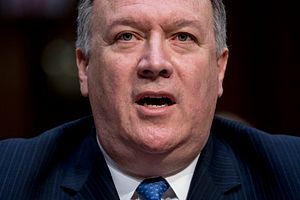With U.S. President Donald Trump’s appointment of Mike Pompeo to be the next U.S. Secretary of State, the hawkish Republican end of Washington’s foreign policy establishment has taken control of the Department of State — or at least it will once more exert influence on the formulation of U.S. foreign policy.
A Tea Party Republican, who was elected to Congress in 2010, Pompeo nevertheless has embraced mainstream hawkish Republican ideas regarding the role the United States should play in the world including a belief in unilateralism and military interventionism underlined by a firm conviction of the utility of military force in international affairs.
As head of the CIA, Pompeo, a former military officer, has pushed for more expansive and aggressive military operations against the Taliban and al-Qaeda, according to media reports. He has taken a hard line against jihadist terrorism, referring to the “threat from radical Islamic terrorism” and praised the prison at Guantanamo Bay as “a goldmine of intelligence” about radical Islamic terrorism.
He has endorsed a hawkish line on Iran saying that Tehran is “intent on destroying America” and in the past favored military strikes against the Islamic Republic. Furthermore, he called the Iran nuclear deal “disastrous,” and said he was looking forward to “rolling it back.” He also heaped praise on Israeli Prime Minister Benjamin Netanyahu and his hardline against the mullahs in Tehran.
On North Korea, Pompeo has likewise taken a more belligerent stance, arguing that Kim Jong-un would use his nuclear weapons to reunify the Korean Peninsula. Additionally, he openly advocated for regime change. “As for the regime, I am hopeful we will find a way to separate that regime from this system,” he said in 2017. “The North Korean people, I’m sure, are lovely people and would love to see him go.” (He partially disavowed his desire to topple Kim Jong-Un in December 2017.)
Similarly, Pompeo is known to be a China hawk and has criticized China’s military buildup in the East and South China Seas as well as the purported theft of U.S. intellectual property by Chinese hackers. “[T]his administration has been very clear of pushing back against the Chinese threat,” he recently stated. In a January interview he noted that China “is as big a threat to the U.S.” as Russia.
Pompeo has repeatedly emphasized the need to stand up to Russian aggression noting that Moscow “reasserted itself aggressively, invading and occupying Ukraine, threatening Europe, and doing nothing to aid in the destruction and defeat of ISIS.” However, he also inaccurately stated publicly that the U.S. intelligence community concluded that Russian interference did not affect the outcome of the 2016 presidential elections — a statement that he later recanted.
In sum, his world view appears to be broadly in line with the hawkish Republican end of Washington’s foreign policy establishment. Over the last couple of months he has gradually gravitated toward a mainstream Republican foreign policy agenda and cultivated their support. (Notably, with the help of Trump’s Chief of Staff John F. Kelly, Pompeo has been regularly meeting with Republican foreign policy professionals around Washington since last fall.)
The major strength of Mike Pompeo will be his strong personal bond with the president. (Interestingly, he personally briefs the president most mornings.) While the national security advisor has gradually replaced the Secretary of State as the President’s most important adviser on foreign policy over the last decades, the chemistry between the president and the secretary of state remains an important component when it comes to successful implementation of the nation’s foreign policy. Consequently, Pompeo will be seen as more credible when speaking for the American president abroad.
The question is how much good that will do him and his department.
If Pompeo embarks on a reform of the State Department and succeeds in allocating additional resources for his organization, it will likely not be enough to restore diplomacy to its rightful place alongside military power as key tools of U.S. foreign policy. Reforms and funds will help little in the uphill battle that the secretary of state will have to fight in order to lessen the impact of the president’s erratic and repeated policy reversals; and the Trump-Kim summit urgently looms. Given all we know publicly about Pompeo, he will accentuate some of Trump’s more bellicose instincts, while likely doing very little to appeal to any better angels of his nature.
Washington’s hawkish Republican foreign policy establishment may have vicariously taken control of the State Department, but it is far from clear whether it will suffice to dampen Trump’s foreign policy dilettantism. Ominously, Pompeo’s appointment may have made military action in Asia by the United States more likely in the future.

































